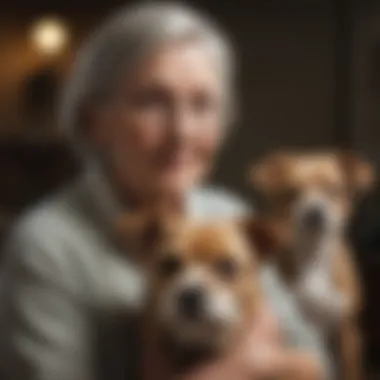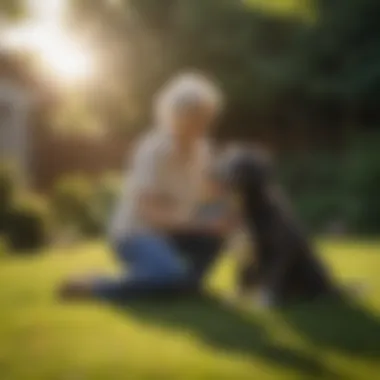Top Non-Shedding Dog Breeds Perfect for Seniors


Intro
Selecting the right dog for seniors requires thoughtful approach. Non-shedding breeds can be ideal companions, assisting seniors in maintaining a clean and comfortable home environment. This article seeks to illuminate the best non-shedding dog breeds. It discusses their temperaments, sizes, and specific care needs that align with the lifestyle of older adults.
Understanding each breed's characteristics is crucial. Knowledge about their maintenance and health consideration ensures that seniors and their chosen dogs share a harmonious life. By analyzing the traits of these breeds, this article aims to guide readers in making well-informed decisions.
Animal Overview
In this section, we will review important aspects of non-shedding dog breeds.
Common Names
Non-shedding dogs include popular breeds such as:
- Poodle
- Bichon Frise
- Shih Tzu
- Yorkshire Terrier
- Maltese
Each of these breeds offers unique qualities that can appeal to seniors seeking companionship.
Scientific Classification
Understanding the classification can deepen appreciation for these breeds. For instance:
- Poodle: Canis lupus familiaris (standard, miniature, toy)
- Bichon Frise: Canis lupus familiaris
Geographic Range
Non-shedding dogs originate from various regions, but many have become popular across the globe.
- Poodles are versatile and originally from France.
- Bichon Frise comes from the Mediterranean area.
- Shih Tzu has roots in China.
This geographic diversity contributes to the distinctive characteristics of each breed.
Behavior and Social Structure
Understanding the behavior of these dogs is key to fostering a strong bond.
Social Behavior
Generally, non-shedding breeds are known for their friendly demeanor. They typically enjoy being around people and can form close ties with their owners. This quality can prevent feelings of isolation among seniors.
Communication
Each breed has its own way of communicating. Many will bark to alert their humans but are often relatively quiet otherwise. Their body language also conveys many messages. Seniors should observe for tail wagging or a relaxed posture as signs of contentment.
Mating and Reproduction
For most seniors, the focus might be on companionship rather than breeding. However, it’s essential to be aware of the characteristics of mating behaviors, so owners can be prepared and support their dog's health accordingly.
Habitat and Ecosystem


This segment addresses where these dogs thrive best.
Natural Habitat
Non-shedding dogs are adaptable and can live comfortably in various settings, including apartments or houses with small yards. Their size and energy levels influence the need for space and exercise definitely.
Food Sources and Diet
Nutritional needs can vary. Generally, a balanced diet consisting of high-quality kibble is beneficial. Senior dog's diet should also be adjusted as they age, addressing any special health needs they have.
Role in Ecosystem
Though domesticated, these breeds have unique roles in their households. They are companions that can improve their owners' mood and social life. Their presence often leads to increased activity, which can benefit seniors greatly.
“A good dog can bring joy and companionship, improving overall health for seniors.”
In summary, recognizing the qualifications of non-shedding dog breeds is invaluable for seniors. As the article unfolds, we hope to provide an insightful understanding to help individuals choose the ideal canine companion.
Preface to Non-Shedding Dogs
Selecting a dog that fits seamlessly into a senior’s lifestyle is essential for creating a positive living environment. Non-shedding dogs present a unique solution for older adults, enabling them to enjoy the companionship of a pet while minimizing concerns such as allergies and household cleanliness. Understanding the characteristics of these breeds can ensure a harmonious relationship between seniors and their canine companions.
Understanding 'Non-Shedding': Definition and Importance
Non-shedding dogs are breeds that do not lose hair in the same way other dogs do. Instead of shedding fur, they have a coat that requires regular grooming to remove dead hair that can accumulate. This is essential for maintaining cleanliness in the home and can be particularly beneficial for seniors who may have mobility issues. Furthermore, non-shedding breeds often produce less dander, which is a common allergen, making them suitable for individuals sensitive to pet allergens. This characteristic is not just about comfort but also impacts the quality of life for seniors, allowing them to enjoy a pet without the added stress of allergy-related complications.
Benefits of Non-Shedding Dogs for Seniors
- Allergy-Friendly: Many seniors face allergies or respiratory issues, making a non-shedding breed an ideal companion. These dogs are less likely to produce allergens, helping maintain a healthier living space.
- Lower Maintenance: While grooming is still required, the absence of regular shedding means less frequent cleaning of hair from furniture and floors, making it easier for seniors to manage their homes.
- Companionship: Dogs provide emotional support and companionship, which is vital for seniors. A non-shedding breed means they can enjoy the benefits of having a pet without the hassle of excessive cleanup.
- Diverse Sizes and Temperaments: Non-shedding dogs come in various breeds, from small lap dogs like the Maltese to more active breeds like the Poodle. This variety allows seniors to find a match that fits their lifestyle and energy levels.
"Choosing the right dog breed can significantly enhance the life quality of seniors, providing them with loyal companionship without significant drawbacks."
Key Considerations for Seniors When Choosing a Dog
Selecting a dog requires thoughtful consideration, especially for seniors. While dog ownership offers companionship and joy, several factors can impact the experience. A senior’s lifestyle, mobility, and living conditions must align with a dog’s needs.
Choosing the right dog can lead to a fulfilling relationship. Understanding crucial aspects such as space, physical activity, and grooming is essential. Each element influences the daily routines and overall satisfaction in the companionship between a senior and their pet.
Space Requirements: Apartment vs.
House
When considering a dog, the living environment holds significant weight. A senior living in an apartment may opt for a small breed, while those in houses can consider slightly larger dogs. However, the dog should have enough space to move freely and play.
Key aspects to ponder include:
- Size of the Dog: Smaller breeds are often more suitable for limited spaces. They require less room to exercise compared to larger breeds.
- Outdoor Access: For those living in an apartment, access to a park or outdoor area is vital for daily walks and play. Ensuring a nearby safe place for physical activity is crucial for any breed.
- Adjustment Period: New pets need time to adapt to their environment. Seniors should consider how quickly they can introduce a new dog to their home and daily routine.
In essence, aligning a dog's space needs with the senior’s living conditions is critical for a harmonious relationship.


Physical Activity and Exercise Needs
Different breeds come with varying exercise requirements. Active dogs may demand time-consuming activities, creating a potential challenge. Seniors should consider their own ability to meet these needs.
For a suitable dog choice, consider the following:
- Energy Levels: Some breeds naturally possess lower energy levels and can manage with brief walks. Breeds like the French Bulldog or Cavalier King Charles Spaniel fit well into a less active lifestyle.
- Health Considerations: Seniors may have mobility issues. A dog with lower exercise needs will ensure mutual comfort. Keeping exercise limited to manageable lengths can prevent strain on both the owner and the pet.
- Daily Routine: Integrating dog walking into existing routines is important. A consistent schedule fosters bonds and encourages physical activity for seniors too.
Ultimately, understanding exercise needs ensures that both the dog and the owner can maintain a healthy and enjoyable lifestyle together without undue stress.
Grooming and Maintenance Considerations
Non-shedding breeds often require specific grooming routines, which can influence the decision-making process for seniors. Regular grooming is not only a commitment but can also affect the pet's health.
Some important grooming aspects include:
- Fur Care: Breeds like Poodles need regular professional grooming. While they do not shed, their fur can mat if not cared for properly.
- Time Investment: Seniors should be realistic about the time they can commit to grooming. Some dogs need more time and attention than others.
- Accessibility: Seniors may need help with grooming, especially for breeds requiring more intensive care. Arranging for a professional groomer or assistance from family can relieve this burden.
Recognizing grooming responsibilities will lead seniors to a suitable non-shedding dog. By considering all aspects, a harmonious and enjoyable dog ownership experience is more achievable.
Top Non-Shedding Dog Breeds for Seniors
Choosing a non-shedding dog breed holds significant relevance for seniors. Many older adults seek to avoid the hassle of excessive fur around the house. Additionally, non-shedding breeds often yield lower allergy issues, making them a suitable choice for individuals with sensitivities. Finding the right dog can enhance the quality of life for seniors. Dogs offer companionship, encourage activity, and can even provide emotional support. The following breeds are not only non-shedding but also possess traits that make them ideal companions for seniors.
Poodle: A Versatile Option
Poodles come in three sizes: standard, miniature, and toy. This breed is known for its intelligence and adaptability, which makes it a strong candidate for seniors. Poodles are eager to please, making training relatively easy. They also have a curious nature, stimulating their need for some playtime, which is vital for seniors to stay active. Their non-shedding coat requires regular grooming, but many seniors find it manageable.
Bichon Frise: The Cheerful Companion
The Bichon Frise is known for its buoyant and lively character. This small breed weighs around 10 to 20 pounds. Its delightful disposition and affectionate nature can brighten the days of seniors. Bichons thrive on attention and companionship, making them affectionate lap dogs. Their fur does not shed, making them an excellent option for seniors with allergies. Regular grooming is needed to keep their coats healthy and tangle-free.
Maltese: Small, Affectionate, and Gentle
The Maltese is a toy breed characterized by its gentle personality. Weighing approximately 4 to 7 pounds, they require little space yet offer a lot of love. This breed enjoys being held and cuddled, creating an emotional bond with their owners. They have a long, flowing coat that doesn’t shed, but it does require regular grooming. Their adaptability makes Maltese a favorable choice for seniors.
Shih Tzu: The Loyal Lap Dog
Shih Tzus are friendly and loyal companions. This breed is particularly well-suited for apartment living due to their smaller size of about 9 to 16 pounds. Their loving demeanor makes them perfect lap dogs. Shih Tzus don’t shed, although their long hair necessitates regular maintenance to avoid mats. Many seniors appreciate their calm temperament, as Shih Tzus enjoy leisurely activities.
Schnauzer: An Intelligent Choice
Schnauzers come in three sizes: miniature, standard, and giant. The miniature and standard Schnauzers are particularly popular among seniors. Known for their intelligence and energy, Schnauzers are easy to train. They require regular exercise, which can be beneficial for seniors looking to stay active. Their wiry coat is non-shedding, but it's essential to maintain their grooming routine.
Yorkshire Terrier: Small Size, Big Personality
Despite their small stature of around 4 to 7 pounds, Yorkshire Terriers have a big personality. They are lively and full of energy while being loyal to their owners. Their non-shedding coats require grooming, but many find that it fosters a bonding activity. Yorkies are alert and sometimes protective, offering companionship that seniors often find comforting.
Italian Greyhound: Graceful and Loving


The Italian Greyhound is a svelte breed known for its elegant appearance and gentle nature. Weighing about 7 to 14 pounds, they are small yet have a graceful demeanor. Their short coat means less grooming, though they still benefit from companionship and moderate exercise. The Italian Greyhound's affectionate temperament appeals to many seniors.
Coton de Tulear: A Happy Little Dog
The Coton de Tulear is often described as joyful and affectionate. This small breed weighs around 8 to 13 pounds. Their playful and friendly nature makes them a hit with seniors looking for a companion. Coton de Tulears do not shed, but they do need regular grooming to maintain their fluffy coats. Their temperament is often calm, making them ideal for relaxed environments.
West Highland White Terrier: Playful and Spirited
The West Highland White Terrier, commonly known as the Westie, is a small breed with a lively disposition. Weighing about 13 to 22 pounds, they adapt well to various living conditions. Their friendly nature makes them great companions. The Westie possesses a non-shedding coat however, it necessitates consistent grooming. Seniors often appreciate their playful yet robust energy.
Basenji: The Barkless Breed
Basenjis are known for their unique trait of being nearly barkless. They have a small frame, generally weighing between 24 to 30 pounds. This breed is intelligent and somewhat independent. They thrive with interaction and engagement. With a short coat that does not shed much, Basenjis require minimal grooming compared to other breeds. Their quiet nature may appeal to seniors looking for a low-maintenance companion.
Choosing any of these non-shedding breeds provides seniors with loving and loyal companions. Each breed has unique attributes that can meet various lifestyle needs, ensuring a deeper bond and mutual understanding between seniors and their pets.
Health Considerations for Non-Shedding Breeds
When selecting a dog, especially for seniors, understanding health considerations becomes crucial. Non-shedding breeds, while often deemed as cleaner and more suitable for various living situations, are not immune to health issues. These factors may dictate both the dog's well-being and the owner's ability to care for them. First and foremost is the understanding that small dogs can have specific health challenges, which makes informed choices essential.
Common Health Issues in Small Breeds
Small dog breeds, including many non-shedding varieties, may face certain health conditions more frequently than larger breeds. Conditions like patellar luxation, dental problems, and heart disease are prevalent among these smaller companions.
- Patellar Luxation: This is a common issue in small breeds. The kneecap may dislocate, leading to pain and mobility issues. Medication or surgery may be necessary.
- Dental Problems: Small breeds often develop dental issues due to crowded mouths. Regular dental care is vital to prevent tooth decay and gum disease.
- Heart Disease: Conditions like mitral valve disease can be common. Regular vet check-ups are crucial for early detection of potential issues.
- Obesity: Given their smaller size, even a little extra weight can cause significant health problems. Monitoring diet and exercise is important to maintain a healthy weight.
Awareness of these issues can lead to proactive measures, improving the overall quality of life for both the dog and their owner.
Preventative Care for Seniors and Their Pets
Preventative care becomes increasingly important for senior dog owners. Understanding how to maintain a dog's health minimizes the risks associated with their breed-related issues. Here are some preventative care strategies:
- Regular Vet Visits: Routine check-ups are essential. They can help identify health problems early and keep vaccinations up to date.
- Dental Care: Routine brushing can prevent dental diseases. Consider dental treats that promote oral health.
- Diet Management: Feeding high-quality dog food tailored to the specific needs of the breed can prevent obesity and other metabolic issues.
- Exercise Routines: Short and gentle walks help maintain mobility and weight control. Ensure exercise is suitable for the dog's age and health status.
- Socialization and Mental Stimulation: Engaging activities can prevent behavioral issues and keep the dog mentally sharp. Puzzle toys or training sessions can help.
Regular health check-ups and a structured care routine are essential for ensuring that non-shedding breeds lead a long, happy life alongside their senior owners.
Understanding these health considerations allows seniors to choose a non-shedding dog that aligns with their ability to provide proper care. By being informed and proactive, seniors can develop a fulfilling relationship with their canine companions.
Finale: Choosing the Right Companion
Selecting a dog as a companion, particularly for seniors, is a significant decision. The right dog can enhance a person's quality of life, offering companionship, warmth, and joy. This article has examined the best non-shedding breeds that align well with the needs and lifestyles of older adults. Understanding which breeds do not shed is only one part of the equation. It's essential to factor in the dog's temperament, size, and care requirements.
Recap of Key Factors in Selection
When choosing a dog, several key elements come into play. Firstly, temperament remains crucial. Many seniors benefit from calm and friendly breeds. Next is size. Smaller dogs are generally easier to manage, especially in tight living spaces such as apartments. Additionally, care needs such as grooming and exercise should align with a senior's physical abilities and the environment they live in. Here is a brief recap of the main considerations:
- Temperament: Look for friendly and calm behavior.
- Size: Smaller breeds may be more comfortable.
- Care needs: Assess grooming and exercise requirements.
- Health compatibility: Ensure both the senior and the dog can accommodate each other’s health needs.
Choosing a dog should not be a rushed decision. It requires some reflection about how a pet can harmonize with the senior’s lifestyle and emotional needs.
Final Thoughts on Pet Ownership for Seniors
Pet ownership among seniors is more than just companionship. It can provide structure to daily routines and promote physical activity. While non-shedding breeds may reduce allergy concerns and cleaning efforts, broader considerations about health and well-being must be taken into account.
Moreover, the act of caring for a pet can have numerous benefits for seniors. It can boost mental health, reduce feelings of loneliness, and create opportunities for social interactions. To make the most informed choice, seniors should invest time in researching potential breeds and understanding their specific needs.







